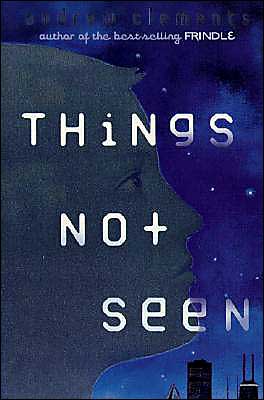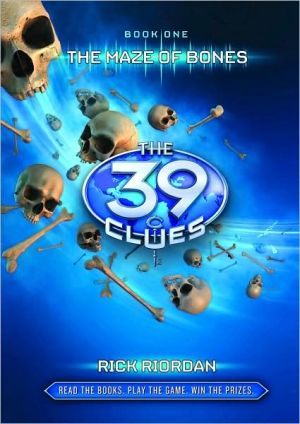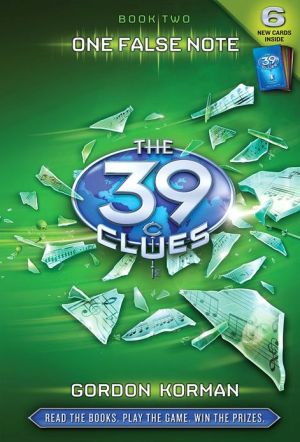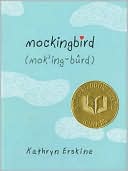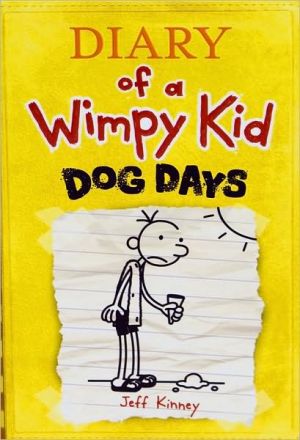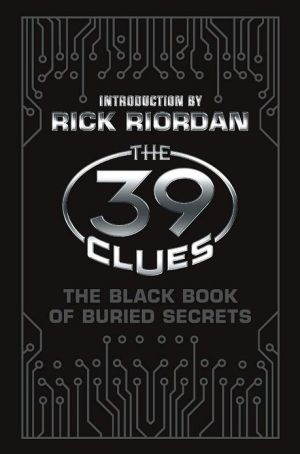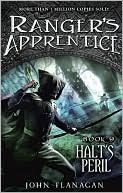Things Not Seen
When fifteen-year-old Bobby wakes up and finds himself invisible, he and his parents and his new blind friend Alicia try to find out what caused his condition and how to reverse it.\ \ When fifteen-year-old Bobby wakes up and finds himself invisible, he and his parents and his new blind friend Alicia try to find out what caused his condition and how to reverse it.\
Search in google:
Bobby Phillips is an average fifteen-year-old boy. Until the morning he wakes up and can’t see himself in the mirror. Not blind, not dreaming—Bobby is just plain invisible. There doesn’t seem to be any rhyme or reason to Bobby’s new condition; even his dad the physicist can’t figure it out. For Bobby that means no school, no friends, no life. He’s a missing person. Then he meets Alicia. She’s blind, and Bobby can’t resist talking to her, trusting her. But people are starting to wonder where Bobby is. Bobby knows that his invisibility could have dangerous consequences for his family and that time is running out. He has to find out how to be seen again—before it’s too late.Publishers WeeklyA 15-year-old boy discovers that he has turned invisible overnight and becomes determined to take control of the situation and of his own destiny. "As preposterous as the teen's predicament may be, the author spins a convincing and affecting story," according to PW. Ages 10-up. (Mar.)n Copyright 2004 Reed Business Information.
In chapters one and two, Bobby has woken up to find himself invisible, really invisible. Now he is trying to figure out just what that is going to mean. He decides to test his invisibility in the library.\ Chapter 3: OUT THERE\ The good thing about February in Chicago is that no one thinks it’s weird if you’re all bundled up. When I get on the city bus headed toward campus, I’m just another person who doesn’t want to freeze to death in the wind chill. The stocking cap, the turtleneck, the scarf around my face, the gloves, it all looks natural. Except maybe Dad’s huge sunglasses. They make me look like Elwood from The Blues Brothers.\ It’s about a half-mile bus ride from home to the stop at Ellis and Fifty-seventh Street. Bouncing along, my heart is pounding so hard, I can hear it crinkling my eardrums. It probably isn’t such a great idea to be going to the library. But I have to. I have to. I mean, what if I sit at home all day and watch TV, and then tomorrow, I wake up and I’m my regular self again? It would be like nothing happened, same old same old. So I’m going to the library to see what it’s like. To be like this. At the library. As long as I get home before Dad does, no problem.\ Looking out the window of the bus, I’m not sure if I’ll be able to get into the library. It’s the big one, the Regenstein Library. You have to show an ID at the entrance. If the person on duty wants to check my face against the picture on my lab school ID, things could get messy.\ But I come here a lot, and I know the guy who’s working at the security desk today. He’s a college kid.\ There’s no line, and I hand him my card. “Hi, Walt. How’s it going?”\ He looks at my picture and runs the card under the scanner. He smiles and says, “Everything’s good, Bobby. You out of school early today?”\ I nod. “Yeah, working on a special project.”\ He smiles and says, “Well, don’t get too smart all at once, okay?”\ I start to walk toward the elevators and Walt says, “Hey . . . ”\ I turn back, and he grins and says, “Nice shades.”\ I know exactly where I’m going. The elevator takes me to the top floor. There’s a men’s room up on five, and I’m betting it’s empty. It is. I shut myself into the stall against the wall and take off my clothes. I wrap everything in my coat. I look around and realize my little plan has a flaw: A public washroom does not offer a lot of places to hide a bundle of clothes. And they have to still be here when I get back.\ Then I look up. The ceiling’s like the one in my basement at home. It’s not too high, and by standing on the toilet seat, I’m just tall enough to lift up a ceiling tile, push it to one side, and stick my bundle of stuff up there next to the light fixture. Then I pull the tile back in place.\ Before I leave the washroom, I look into the mirror above the sinks. I have to make sure I don’t look like I feel. Because I feel the way I am—which is totally naked. And I hope that at least for the next little while, I really do stay invisible.\ Leaving my house, riding the bus, walking through the library—when I did all that I was wearing a full set of clothes. And my eyes told my brain that everything was normal. And I had no trouble walking or seeing my hand put quarters into the slot on the bus. That’s because my hand was in a glove and my feet were in my shoes.\ Now I’m lost in space again, like that first trip down to the kitchen at breakfast this morning. My hands and feet don’t know how to obey me.\ I take it slow, feeling all dizzy and disoriented. I make myself walk back and forth through one of the periodicals sections, stepping carefully around chairs and tables. My shadow is barely there, more like a ripple, sort of like the way light bends above a hot radiator. I try to reach out and touch the corner of an Arabian newsmagazine. I miss it by about three inches on the first try. It’s like that coordination test where you have to shut your eyes and put your arm out straight and touch your pointer finger to the tip of your nose. Or like getting to the bathroom in the middle of the night without turning on a light and without running into your desk. It takes practice. And after about ten minutes, I’m getting a lot better. So I take a walk around the rest of the fifth floor.\ I know I’ve been up here on the fifth floor once or twice before, but nothing looks the same. Everything is different. Except it’s not. It’s me. I’m what’s different. I’ve never felt the carpet on the soles of my feet before, never felt the cold air rolling down off the windows along the north wall, never been even half this alert. It’s like everything is under a bright light, and I’m worried that the handful of people scattered around at tables and computer terminals or reading newspapers in easy chairs can hear the pounding of my heart.\ I end up back by the elevators. I’m steadier now, ready for places with more people, ready to do some serious exploring. I push the down button, then I remember—I’m not really here. The doors slide open, and nobody’s inside. Still, it’s probably not a good idea to get into a small room that could fill up. So I walk down the stairs to the fourth floor—slowly, hanging on to the handrail. I’m hoping that everyone is too busy to notice when the stairway door opens all by itself.\ On four, students are all over the place. And I know why. Midterms. Same thing at the lab school library, I bet. But that’s got nothing to do with me, not now. I’m having a little winter break. I just get to stroll through the beehive and watch the drones buzz from book to book, filling up their heads so they can dump them out into test booklets a week from now.\ There’s a girl using the online card catalog. She looks young, maybe a freshman. She taps on the keys, looks at the screen, frowns, shakes her head, and then taps some more. Bending over the keyboard, a long strand of brown hair keeps falling down into her eyes, and she keeps trying to hook it behind her left ear. She’s having trouble with the computer.\ I walk up right behind her and look over her shoulder at the screen. She keeps highlighting a book title, but she can’t get the computer to go to the next screen. I know what to do. All she has to do is press F7. But she keeps hitting the escape key, and it takes her backward. I step closer, and I wait until she has the title highlighted again. It’s a book called Summerhill. Then I lean forward, reach past her, take careful aim, and gently push the F7 key. The screen jumps ahead.\ The girl does a double take. Then she gives a little shrug and pushes the print key.\ I’m so pleased with my good deed that I don’t think. Because if she’s pushed the print button, then this girl’s probably going to push something else. And she does.\ The girl pushes her chair back, and one of the black plastic wheels rides right onto the big toe on my left foot.\ I can’t help it. I yell “Ahhh!” and push the chair forward.\ The girl gives a sharp squeal and scoots her chair backward again, harder. It almost clips me a second time, but I limp over and stand near the wall—not too close, because I don’t want my shape to show up as a blank space like my hand did on my desk this morning. It’s hard to tell by just touching, but I think my big toenail is torn up.\ Even a little squeal sounds loud in a library, and that brings four other students to see what’s happening to the girl.\ She can’t explain. She turns bright red and says, “I guess I just scared myself.”\ The other kids drift away, and the girl goes to get her printout. But when she comes back, she picks up her stuff in a hurry and moves to a different workstation over by the windows.\ I feel my hands shaking, and my breathing is ragged. What if I had a real injury instead of a stubbed toe? Something serious? Like if I had a broken leg, and I’m in a heap in the stairwell, and I’m losing consciousness—what then? And I don’t know the answer to that.\ In a few minutes the pain in my toe dies down a little, so I head for the third floor, slowly and limping a little. And I’m more careful.\ I know the third floor best. It’s where they keep the recordings. They’ve got walls of vinyl LPs and the old 78 rpm records, even wax cylinders from the first Edison talking machines. It’s where they keep a collection about Chicago’s music. I did a term paper on the history of jazz in Chicago when I was in eighth grade. I had special permission to use the records, and the listening rooms too. They’re like recording studios. No matter how loud you turn up the sound, it doesn’t leak out. I even played my trumpet along with some of the records and no one came to tell me to shut up. That was one paper I didn’t mind doing.\ The third floor is even busier than the fourth. I move carefully, taking my time now. I glide by on my bare feet. I look, I listen. I’m out in public, but I am completely alone. There’s action all around me. People are doing things and saying things, but it’s like they’re in a different dimension, like they’re on a stage or a screen. And me? I’m just watching, an audience of one, watching secretly. I can’t talk or sneeze or clear my throat. I can’t pick up a newspaper or turn the pages of a book or switch on a CD player. It’s like I’m a gnat. Fly around on my own, and no one notices me, no one could care less. But if the gnat decides to fly into someone’s ear? That can be dangerous.\ I’m glad my big toe is throbbing. It’s a good reminder that the rules have changed.\ Standing here looking at a photograph of Louis Armstrong, suddenly it’s clear that I’ve learned what there is to learn about the library today. Which is, if you have to tiptoe around, and you can’t touch anything, and you can’t open a book or even whisper, then what’s the point?\ I hike the stairs back up to the fifth floor, and I don’t even have to hold on to the railing. My feet know where they are now.\ At the washroom door I stop and listen. All clear. Then I’m inside the toilet stall with the door locked. The ceiling tile slides easily to one side, and I’ve got my clothes bundle. Then—voices, deep voices. The washroom door hisses open. It’s two men. The door shuts, and their voices get louder because once inside, they stop thinking about being in the library. They talk in a language I don’t know, standing side by side against the far wall. They finish, wash their hands, turn on both electric dryers, and then leave. They never stop talking.\ All this time I’m holding my breath. I don’t know if they looked up to see the missing ceiling tile or not, and I don’t care. All I know is they’re gone and I’m not busted.\ Less than two minutes later I am fully wrapped and coming out of the stairwell door on the ground floor. I’m not running, but when I glance at a wall clock, I feel like I should start. It’s 3:25, and my dad could already be on his way home from work. I don’t feel like explaining what I’ve been up to.\ I don’t have a book bag or anything, so I pass between the thief detectors and head for the exits at a slow trot. Can I catch a bus, or do I have to run the half mile with a bad toe to get home in time to keep my dad from throwing a fit? That’s what I’m thinking, and by the time I actually reach the doors, I’m flying.\ Just then, Walt calls out from the desk behind me, “So long, Bobby.”\ Walt’s a good guy, so I turn to give him a quick wave. Which isn’t smart, because I’m moving too fast. There’s a blur on my right side. It’s another person headed out the same door I’m charging at.\ There’s no way to avoid the contact. It’s a pretty solid hit, but neither of us falls down. Still, the girl’s backpack drops to the floor and three cassettes go clattering onto the floor.\ I’m scrambling for her stuff, and I feel like an idiot, and I’m saying, “Jeez! . . . Sorry. Are you okay? I’m really sorry. Here you go. I’ve got everything.” I tuck the cassettes back into her bag and straighten up.\ Then I notice something else I should pick up, but for two seconds I’m frozen, locked with fear. Because it’s my scarf down there on the floor. I scoop it up and glance around, and I’m glad because there’s nobody else really looking at me.\ But the girl is. She’s looking at the very place where I’m uncovered, from my nose to my chin. As scared as I am, I can’t help noticing how pretty she is. It’s weird how she’s smiling, and she’s got this strange look in her eyes. And I’m waiting for the scream, and I’m ready to take off running, and I’m thinking, Oh, man, I’m dead!\ But the girl keeps smiling as she reaches out for the strap of her book bag. She says, “I’ve dropped something else—over there, maybe?”\ And I look where she’s pointing and I see it, about two feet away.\ I put my scarf back on. Then I pick up the thing she dropped and hand it to her. And I know why my invisible face didn’t make this girl scream.\ Because what I hand her is a long, thin white cane.\ This girl’s blind.
\ Publishers WeeklyA 15-year-old boy discovers that he has turned invisible overnight and becomes determined to take control of the situation and of his own destiny. "As preposterous as the teen's predicament may be, the author spins a convincing and affecting story," according to PW. Ages 10-up. (Mar.)n Copyright 2004 Reed Business Information.\ \ \ \ \ VOYAAt first it seems like any other Tuesday. Throwing off his electric blanket, fifteen-year-old Bobby stumbles to the bathroom to shower, and it is not until he wipes the fog off the mirror to comb his hair that he notices something is missing—him. Bobby quickly finds out that the reality of being invisible is quite different from what is portrayed in movies and books. Only his mother and father can know—not school, not friends, no one. Not only is Bobby invisible, but he also is alone. His mother and father approach his new condition as they approach everything else in life. His physicist father attempts to dissect the problem as he would any other scientific anomaly, whereas Bobby's mother is likely to smother him with attention and orders. Luckily, it is winter so no one seems to notice when he escapes to the library covered by layers of clothing. Once there, he strips down and proceeds to stroll silently through the library until he meets Alicia, the one person who will not notice that he is invisible. She is blind. Through Alicia Bobby learns that there is something worse than being invisible, and that is being made to feel invisible. Together they help each other work through their situations to find friendship and a new strength that they did not realize they possessed. Written in a more serious tone than Clements's popular Frindle (Simon & Schuster, 1996), this novel will prove thought-provoking as it asks the reader to consider all the "things not seen." VOYA CODES: 4Q 4P J (Better than most, marred only by occasional lapses; Broad general YA appeal; Junior High, defined as grades 7 to 9). 2002, Philomel, 256p, $15.99. Ages 12 to 15. Reviewer: Heather HeplerSOURCE: VOYA, February 2002 (Vol. 24, No.6)\ \ \ KLIATTBobby Phillips, age 15, wakes up one morning, goes to comb his hair in the mirror—and sees no reflection. He's become invisible, and while there are some advantages, like sneaking around unseen, it quickly proves to be a big problem. He tells his parents, of course, but fearing he would become an experimental subject they try to keep Bobby's condition hidden from the world. He can't go to school, naturally, but the school quickly becomes suspicious, and tries to investigate his absence. Bored at home, Bobby sneaks out to the library, where he bumps into a blind girl, Alicia. They become close friends, and she helps him to finally figure out how to reverse his condition. As the title hints, this is a tale about sight and insight, as well as the fanciful theme of actual invisibility. Bobby's growing relationship with Alicia is a major part of it, along with trying to keep Bobby's problem hidden and finding the solution to it. I wish Clements, the author of Frindle and other books for young readers, had spent more time exploring the upside of invisibility; mostly Bobby worries about his invisibility, rather than having any fun with it. Still, the intriguing premise of the story will keep readers turning the pages. Category: Hardcover Fiction. KLIATT Codes: J—Recommended for junior high school students. 2002, Penguin Putnam, Philomel, 252p., $15.99. Ages 13 to 15. Reviewer: Paula Rohrlick; KLIATT SOURCE: KLIATT, March 2002 (Vol. 36, No. 2)\ \ \ \ \ Children's LiteratureWhat if you woke up one morning and found you were invisible? This is the dilemma Bobby Phillips faces—being invisible changes his whole life. If he leaves the house, he either has to cover himself completely, or wear nothing at all. His parents are having a hard time explaining his extended absence from school. He has to keep his condition a secret, and this causes even more problems. When Bobby meets Alicia at the library, he believes he's found a friend who will accept him as he is. Alicia is blind, so his invisibility doesn't matter to her¾once she believes he is telling her the truth. Their growing friendship and the mystery concerning Bobby's condition make for an absorbing, imaginative tale. 2002, Philomel Books, \ — Joanne Draper\ \ \ \ \ School Library JournalGr 6 Up-"-I turn on the bathroom light and wipe the fog off the mirror to comb my hair.-I'm not there. That's what I'm saying. I'm. Not. There." Thus starts the adventure of Bobby Phillips, who wakes up one morning to find that somehow he has turned invisible. The 15-year-old and his parents live with the worry of what happens if they can't figure out how to reverse his condition. With a nod in the direction of H. G. Wells's Invisible Man, Clements allows readers to speculate what it would be like to be invisible. As they see Bobby deal with his situation, they also experience his fears of being alone, unable to talk to his friends, or to tell anyone for fear of the consequences. He reaches out to a blind girl, Alicia Van Dorn, and together they begin to fight back as best as they can. The quest for visibility becomes even more frantic when the school officials and the local police decide that Bobby is the victim of foul play. The threat of having his parents thrown in jail for his own murder makes the teen even more desperate to find out what happened to him. Clements's story is full of life; it's poignant, funny, scary, and seemingly all too possible. The author successfully blends reality with fantasy in a tale that keeps his audience in suspense until the very end.-Saleena L. Davidson, South Brunswick Public Library, Monmouth Junction, NJ Copyright 2001 Cahners Business Information.\ \ \ \ \ Kirkus ReviewsClements (The Jacket, above, etc.) looks beyond grade school for the first time with a multifaceted rumination on selfhood and various forms of invisibility. Fifteen-year-old Bobby wakes up invisible one morning. His equally flummoxed parents, quickly grasping the personal and social dangers should the news get out, urge him to hole up at home. But boredom, worry, and the mutinous thought that he should have some say in the matter soon lead him into a string of adventurous outings, both wrapped up Invisible Man-style, and stark naked. Clements cranks up the stress with an ensuing traffic accident that puts both parents into the hospital, and, as weeks pass, the increasingly persistent attentions of the governmental child-welfare machine. He also provides a needed confidante for Bobby in Alicia, a teenager blinded by a head injury two years before and no stranger herself to that sense of being unseen. Both feeling angry, scared, and vulnerable, their relationship gets off to a wonderfully tumultuous start, but builds on a foundation of caring and loyalty into something solid enough to survive Bobby's final return to visibility. As always, Clements's genius for developing credible plot lines (even from oddball premises) makes suspension of disbelief no problem. His characters, each one fundamentally decent-there is never a chance that Bobby will go the way of the transparent voyeur in Cormier's Fade (1988), for instance-are easy to like. A readable, thought-provoking tour de force, alive with stimulating ideas, hard choices, and young people discovering bright possibilities ahead. (Fiction. 11-15)\ \
